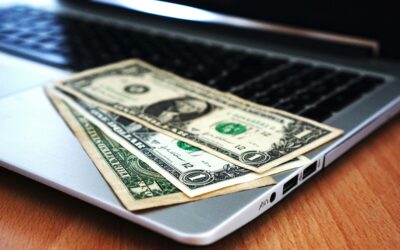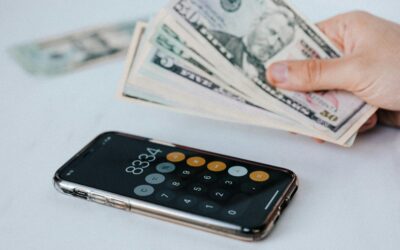Should I Take a 401(k) Loan?
In an emergency, should I take a 401k loan? George breaks down your options and talks about how to position yourself and family for success!
Listen to us On
About the Episode
Should I take a 401(k) loan? When we find ourselves in a financial emergency, what’s the best way to handle it? George G breaks down how 401(k) loans work, the damage they can cause when done incorrectly, using credit cards or personal loans to cover emergencies, and how to proactively position yourself and your loved ones for financial success!
Did you get anything out of this episode? Do us a solid and leave a review:
https://ratethispodcast.com/alignedmoneyshow
Learn more and engage at MoneyAlignmentAcademy.com, Twitter, LinkedIn, Instagram, YouTube and Facebook.
Buy George G a coffee (he loves coffee)
https://www.buymeacoffee.com/lifeblood
Have George G speak
https://moneyalignmentacademy.com/speaking/
Financial literacy and wellness for individuals, families, and companies
https://moneyalignmentacademy.com/
Find George G’s books here
The Aligned Money Show is the podcast for Money Alignment Academy, copyright 2024.

George Grombacher
Host
Episode Transcript
All right, this week’s letter, this week’s letter comes from lil Abby mill, Abby writes, Dear George G. In case of an emergency, would you rather would you rather take out a 401 k loan? Or put that emergency on a credit card? Great question. Little Abby, great question. But the answer is, neither answer is neither. Because you should have money saved up. So you don’t find yourself in that predicament. Not super helpful. Here poor little Abby is asking for some help. And I’m being an absolute jerk, trying to give some tough love, but again, not super helpful. And I get it. I have 100% BIM there. In that predicament. I don’t know, the lab is asking for a friend or parents or whatever. But I have 100% been in the predicament where I was in an emergency, and I didn’t have any money. And I, frankly, I didn’t even have any money on a credit card. So my only option, and I’m I am. I’m, what’s the term, I am more than happy to talk about everything, it’s essential for me to talk about my financial struggles in my 20s. Because it’s just an important thing, it’s a very real thing. And I’m fortunate to have made a lot of great financial decisions. And I made plenty of terrible, absolutely terrible financial positions, or decisions, and positions. And, and all the other ins. So I totally get it. And right now we’re in a unique time, and I’m sure 10 years from now we’ll find ourselves in another unique time where money will be tight, and just trying to figure it out. Like that’s sort of the deal is, maybe you’re somebody who will never encounter financial hardship. And I hope that that’s true, I hope that that’s the case. It’s a boulevard of uninterrupted green lights, just speed through life and never have a care on the world. But the rest of us will go through personal financial struggles at some point. The trick is, I guess, I think that when we overcome them, we put ourselves in a position where we will not find ourselves back in that position. That’s kind of the trick find success that lasts I hesitate to say sustainable, because that words a little heavier than it used to be. But I’m looking for sustainable financial success, financial peace of mind. So kinda like losing weight, you know, like lose weight, put the weight back on, lose weight, put the weight back on, I want to find sustainable success with my diet and exercise program, but also my personal finances. So and like all things better to go through this exercise early in life, we have more energy. And we have more time, theoretically speaking, to be fighting through some of these problems. So back to you. And back to me, when I was in my 20s, I again found myself in what you would consider to be a financial emergency, with no room on my credit cards. And so not only did I take money out of a 401k, I just cashed it in. I just cashed in a 401k account from a previous opportunity. And if you don’t know what happens when you do that you pay theoretically speaking, it was traditional. So that meant the money that went into the 401k is pre tax. So I cancelled it, I would just took the money out. And so what happens is, you get the money, but they will you will pay a 10% penalty on all the money that comes out. So I had that waiting for me. And then you gotta pay income tax on all that money also. So it’s just it’s a bad scenario in so many different ways because gets you out of an emergency very, very temporarily because then you find yourself in another emergency shortly thereafter, within a year obviously because when income taxes come down Do you now have this big tax liability cell? So 401 k loan, credit card, I guess, I guess one of those options would probably be better for me. So we’re having this conversation because I hope to help you, if you find yourself actually in this position that you will not have to make the kinds of decisions that I had to make. I mean, there are very few decisions in life or mistakes in life that are 100% permanent, I guess that there’s plenty of them. And I’m sure that I’ve probably made plenty of permanent mistakes or decisions. This one for me was a bump in the road. And I am one of those people who learned from my mistakes and did the things that I’m going to share with you. So I share all this stuff, just to let you know, wherever you are, I’m pretty confident I can help you get to where you want to go find yourself in this position. Okay, let’s let’s get through it, and then put ourselves in a position to be more successful moving forward, do things more on your terms than having to respond to negative circumstances, and to do so in a way that is not going to put you really behind? And cause any permanent damage, maybe just slow you down a little bit. So all right. So now 20 years later, well, that’s weird to think about, isn’t it? Well, 20 years later. I’m going to share accumulated wisdom. Yeah. Okay, we’ll see about that. So I want to give you a brief overview of 401k loans, how they work. So most of us most 401k plans, not a 401 K plans are the same. In fact, each 401k plan has sort of a plan constitution or a plan document that gives the rules and not all 401 K’s allow for loans. So this may or may not be an option for you. But a lot of 401 K’s will allow you to borrow up to 50% of the money that is inside of your account. So if you have an account balance with $100,000, you can take up to 50,000. That’s not only, that’s not a good example, let’s say that you had, let’s say you had 50,000 and your 401k, you could withdraw 25,000 of it in the form of a loan. All right, the total you can take out of a 401k for a loan is 50,000. So that is how that works. And the loan can be for up to five years. Because you’re not technically withdrawing the money, even though you are taking the money out, you are borrowing it. So you’re not paying the penalty on the loan, that 10% penalty that I talked about, or that I had to pay, and you’re not paying tax on it, you do pay an interest rate that you do pay an interest rate as you’re paying it back. But that money actually goes back to you. So you’re paying yourself interest. Okay, so that’s how that works. So you can do it over the course of five years, you can certainly do it much quicker if you’re in a position to do that. So there’s also hardship provisions which have been changing with secure act and different legislation and stuff like that. But there’s sometimes a hardship provision, which allows you to take money out without pay penalty and stuff like that. So if you are in a position, you’re curious about this stuff, you simply need to reach out to whoever’s in charge of employee benefits at your organization and get the answers. Okay. I think that most of us understand how credit cards work, but not as many of us understand how a personal loan works. Because Abby’s question here, the young lady who wrote the letter was asking whether or not it makes more sense to take out a credit card or to put the emergency on a credit card to pay for it with a credit card or to take out a personal loan or 401k loan rather. So it’s sort of another option.
So credit card, personal loan, 401k loan, personal loan, you borrow it from the bank, just like you know, we borrow everything comes from a bank or some kind of an online lender that you then will make monthly payments on. So you go to XYZ personal loan bank, they say here’s, here’s 20 grand, you’re going to pay us back over the course of essentially two to seven years, and you can choose the the payment period, so you get to pay back the principal plus interest. So you theoretically speaking, I was gonna say when but you get the money that you need, and the bank gets the money back plus some interest. So that is one of those win wins. A personal loan is an unsecured loan, you’re talking about the difference is a secured loan, which is your house or your car. So you take out a second mortgage on your house. It’s secured by your house. So if you default the bank’s gonna come Don’t take your house, if you don’t pay your your car loan, the bank’s gonna come take your car, you don’t pay a personal loan, well, they can’t come and take you, they put you in jail, now I can put you in jail, it will hurt your credit. Okay? So that is how that works within a few days of getting approved for a personal loan, they give you the money, minus any fees or whatever, and then you use it for whatever you want. Okay, typically start repaying it after 30 days, and like I talked about, it’s usually two to seven years. Once you pay the loan off, it goes away, you have, you have satisfied the loan. So that’s how that works. There was a nerd wallet survey, it’s a financial organization published in October of 23. That said, almost 30% of Americans took out a personal loan in the past year, and the total that they took out was an average of $6,299. So there you go, 60 to 99. Sounds a lot like the average credit card balance in the United States. So quickly about 401k loans. The Rand Institute did a study a couple of years back, and the big takeaways were one in 10 loans, one in 10, 401k loans results in a default. Okay, so 10% of the loans taken out, on average resulted in a default, and eight out of 10 people who leave a job with a loan, then default on that loan. Okay, so that’s different. So if you have a loan, you leave employment, you have an 80% chance that you’re going to default on that 401k loan. So that’s not good. So when you have also some findings from that study, where that people that were low income, or the head, low balances were much more likely to default on their loans than to repay them. And that happened when they got terminated. So that’s obviously not a good thing. It’s not good for anybody to default on anything. But this is the problem of defaulting on a 401k loan is more is experienced more greatly by people who have less money. If you have less money, you earn, you earn smaller income, you have less money, you’re more likely to default on your 401 k loan, which then results in the pain that I suffered, which is 10% penalty, potentially income tax on the full amount. So from the frying pan into the fire, suboptimal bad. But here’s the really bad news. In a recent study conducted by the employment Benefit Research Institute, they found out they discovered that typical 401k loan default costs you the average borrower borrower, an extra $150,000 in retirement savings over the course of their career. So I’ll say that again, what happens is, when you take out a 401k loan, if you’re a young person between 25 and 35 years old, it costs you $150,000, over the course of your career, ouch. So why is that? Well, it’s an opportunity cost. It’s the time value of money, you put $6,000, into your 401k, when you’re 25 years old, and you let that run until you are 65 years old. That is what that’s talking about. So when you take that money out, you lose out on the compound interest, you learn out, you lose out on the amount of time that that money is invested. And it costs around $150,000. So that is extremely punitive, more so than just cashing out a 401k. And thinking that the penalty you’re gonna pay is 10%, plus ordinary income tax. So we can just use me as an example, I was that 25 year old that did that, essentially. So that money that would have been still growing today, and working for me, is now I’m working. So it’s working against me. This thing about time value money. Another thing that’s true about it is that the longer we take to start pursuing our financial goals and objectives, the harder they become to reach just because of the things I just laid out. So there’s a really high cost taking out 401 k loan. So perhaps using a credit card to cover an emergency could be the better choice. I don’t know that I ever thought that I would hear myself say that. So using a credit card, or a personal loan might be a better choice. So let’s talk about that. Let’s talk about certain current state to play when it comes to a credit card interest rate, or 401k loan. So right now, the average annual percentage rate on credit cards around 21.47%, it’s right around there. So the average 401k loan $6,299. So you apply that 21% To 60 to 99, that comes out to just over $1,300. Okay, so by my calculation, $1,300 is less than $150,000. So it’s all assuming that you take the four, you take money out of your 401k, you don’t pay it back, it’s not sitting inside. Okay? So just by the math. Now, whether you believe that to be true or not, it’s this is all just to give you something to chew on. But I am hoping that you are just turning, turning tuning in to learn. Now, because you’re actually in the predicament you’re trying to figure out the best thing to do, but certainly an option for you. So the potential cost of the 401k low and being $150,000, in opportunity cost over the course of a career versus, you know, paying a personal loan. And there’s challenges to that. But I think I think you sort of understand the case that I’m trying to make or just, I’m trying to lay this out for you. Ideally, that you will be clear of this. Let’s fast forward three years from now. You have paid back your 401 k loan, you have, you know, gotten out of your emergency and paid off your credit cards, whatever it might be. What my proactive I want you to proactively get to the point where you find yourself in a sustainable personal financial situation is what I want. So Steps to Success. How do we get from here to there, number one, get your emergency fund started. The first step in doing that is to get $1,000 saved up. So I want you to open up an account a savings account or money market account, and start putting money in there until you get to $1,000. That’s the beginning of your emergency fund. $1,000 is enough to cover most minor emergencies. Okay, I know that. That’s just your starting point. So step number two is the golden rule of personal finance, which is pay yourself first. So start making contributions to your, your financial objectives. So that could come in the form of investing or contributing to your 401k It’s a great way to pay yourself first, because before the money hits your checking account, it goes into your 401k account, it works if you’re at an employer that offers a 401k, I can’t encourage you enough to enroll in that even if it’s at 1%. Just get started. can also open up an IRA, an individual retirement account or a brokerage account or another savings account. Just start paying yourself first before you pay anybody else. The next step is I want you to get one month’s worth of expenses saved up. Okay, get one month’s so this means we need to know our cash flow, how much money we have coming in, how much is going out, we need to have a budget. So we have a better understanding of our of our financial situation. Those are not the most fun things to do. And I’m not saying that they are I’m saying that they’re essential. Step number three is to then get one month’s worth of expenses saved up. Then step number four, if you have credit card debt, step number four is I want you to get mad at that credit card debt and aggressively worked paid off. So put a plan together. If you need a little bit of help doing that I have a free course you can access for free, it’s called get out of debt, you can check that out, I’ll put the links in the notes. Then once you’ve done that, however long it takes you, I want you to get two months of expenses saved up than three, that for that five, and six.
I know how easily those words escape my mouth, blow into your ears. I know how hard that that actually is to do. I also know how important it is to do. Once you have a fully funded emergency fund. Six months worth of expenses saved up you’ve got credit card debt paid off. You’re starting to save for yourself and your financial priorities. You can let the tension out your shoulders for my money, my perspective, that’s financial peace of mind right there. And there are fewer things more valuable than that. So get yourself out of the problem that you’re in, or whatever it might be. If you’re not in the problem, that’s awesome. Make sure that you are working to position yourself for success. Whatever comes your way. I don’t have any control over what’s going to happen to me. All I can do is put myself in the best possible position to weather any storms as it would be. So those are the steps and then you are off to the races. So there it is little Abby, thanks for the letter. As always, don’t take a 401 k loan, don’t use credit cards. Don’t do dogs. solid advice. That’s for everybody. Finally, run the reminder. Never going to be anybody more interested in your success than you are your financial success than you are. So act accordingly.
More Episodes
How to Make Sure You Don’t Outlive Your Retirement Nest Egg — With the Help of Annuities
One of the biggest fears facing retirees today isn’t boredom, health issues, or even the rising cost of living. It’s the fear of outliving their money. And it's a valid concern. With people living longer, markets remaining unpredictable, and inflation eating away at...
How to Have an Anxiety-Free Retirement Using Budgeting and Annuities
Retirement should be a time to relax, explore your passions, and enjoy the life you've worked so hard to build. But for many retirees, financial anxiety can cast a long shadow over those golden years. One of the most effective ways to manage this anxiety is through...
How to Manage Financial Uncertainty and Anxiety in Retirement Using Annuities
Retirement is meant to be a time of relaxation, freedom, and enjoyment. But for many retirees, it can also bring anxiety and uncertainty—especially about finances. Concerns about outliving savings, market volatility, rising costs, and unpredictable healthcare expenses...
How to Handle Inflation on a Fixed Income in Retirement
Inflation is one of the biggest threats to a comfortable and sustainable retirement. As prices for everyday goods and services increase over time, the purchasing power of your money decreases. For retirees living on a fixed income, this can be especially challenging....
Finding Safety in Retirement with Annuities
Planning for retirement is one of the most significant financial journeys a person takes. While retirement is often envisioned as a time of relaxation and enjoyment, many people face the looming question: "Will my money last?" With market volatility, rising healthcare...
Using Annuities to Overcome the Fear of Spending Too Much in Retirement
One of the biggest concerns for retirees is striking the right balance between enjoying their savings and making sure they don’t run out of money. The fear of spending too much too soon can lead to financial anxiety, limiting a retiree’s ability to fully enjoy their...
Why Investors Choose Annuities for Secure Retirement Income
Planning for retirement is one of the most critical financial decisions a person will make. With concerns about market volatility, longevity, and sustainable income, many investors turn to annuities as a solution for secure retirement income. But what makes annuities...
Using Annuities to Create Tax-Efficient Income in Retirement
One of the biggest challenges in retirement planning is managing taxes effectively. Many retirees focus on accumulating wealth but overlook the impact of taxes on their income. Without a well-structured strategy, taxes can eat into your retirement savings and reduce...
How to Overcome the Fear of Running Out of Money in Retirement with an Annuity
One of the most common fears among retirees is running out of money. After working for decades, the last thing anyone wants is financial insecurity during their golden years. The fear of outliving your savings can be paralyzing, leading to stress and uncertainty....
Join the show.
Interested in being on the show? Tell me a little bit more about you and what you’d like to talk about!














